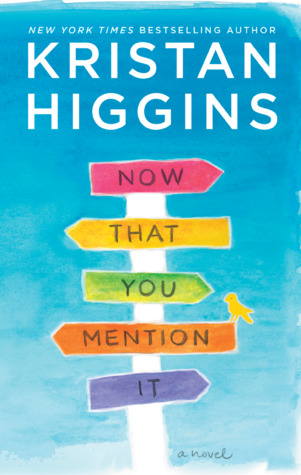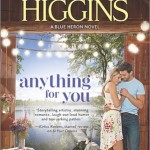 Now That You Mention It by Kristan Higgins
Now That You Mention It by Kristan Higgins Formats available: hardcover, paperback, ebook, audiobook
Pages: 384
on December 26th 2017
Purchasing Info: Author's Website, Publisher's Website, Amazon, Barnes & Noble, Kobo, Bookshop.org
Goodreads
One step forward. Two steps back. The Tufts scholarship that put Nora Stuart on the path to becoming a Boston medical specialist was a step forward. Being hit by a car and then overhearing her boyfriend hit on another doctor when she thought she was dying? Two major steps back.
Injured in more ways than one, Nora feels her carefully built life cracking at the edges. There's only one place to land: home. But the tiny Maine community she left fifteen years ago doesn't necessarily want her. At every turn, someone holds the prodigal daughter of Scupper Island responsible for small-town drama and big-time disappointments.
With a tough islander mother who's always been distant and a wild-child sister in jail, unable to raise her daughter--a withdrawn teen as eager to ditch the island as Nora once was--Nora has her work cut out for her if she's going to take what might be her last chance to mend the family.
But as some relationships crumble around her, others unexpectedly strengthen. Balancing loss and opportunity, a dark event from her past with hope for the future, Nora will discover that tackling old pain makes room for promise...and the chance to begin again.
My Review:
Robert Frost said that “Home is the place where, when you have to go there, they have to take you in.” He said nothing about them having to like it. Or you.
Nora Stuart feels like she has to return home, to tiny Scupper Island, to see if she can get her life back on track after an accident. And a wake up call.
Nora’s life has been gray for a while now. She’s been going through the motions after something she refers to cryptically as the “Big Bad Event”. She figures that she’ll snap out of it eventually, and go back to being bright, sparkling, electric Nora, who escaped her tiny island home, her broken family, and her history as the high school “troll” to become a successful doctor.
But when the Beantown Bug Killers van mows her down and nearly kills her outside the hospital, it’s kind of a cosmic kick in the pants. As is waking up in recovery to see her boyfriend telling her nurse that he was planning to break up with her but now can’t as she’ll need help after her accident.
Nora decides she doesn’t need his help THAT bad. She can always go home to her mother on Scupper Island, and face all the demons she left behind. And while that might seem a bit melodramatic, the fact is that in high school, the other students pretty much were demons in the way they tormented fat, lonely, miserable Nora.
Going back will give her the chance to mend fences with her extremely capable but emotionally distant mother, reconnect with the niece that she has been ruthlessly pushed away from, and hopefully discover what really happened the day her father left the island and his family forever, and seemingly took all the bright happiness of her childhood with him.
But Nora left Scupper Island 17 years ago with the town scholarship to Tufts University, and no one seems to have forgotten that Nora “stole” the scholarship that should have gone to the town’s golden boy, That scholarship was given to the high school senior with the highest GPA, and Nora won fair and square. Not that anyone believes that, not even Nora.
Even though small towns have long memories, Nora discovers that some things (and people) have changed. A lot. And some not at all.
The question is whether Nora has changed enough to let herself be, not the miserable child she was, nor the bright, sparkly person she chose to be, but the person she really is. And to discover the best life to make that person, her real self, happy.
Escape Rating A-: Kristan Higgins writes quintessential “women’s fiction”, and as much as I hate the term, I love her storytelling.
The story of Now That You Mention It is all about Nora and her relationships with the women in her life; her unapproachable mother, her lost sister, and her disaffected niece, but it’s also about Nora’s relationship with the person she used to be. Part of her journey is for Boston-Nora-the-Doctor to make peace with Scupper-Island-Nora, formerly known as the troll. And it’s not going to be easy for those two people to meet in the mushy middle and make up Nora-who-is-just-Nora.
There is a romance as part of Nora’s journey, but it’s not the focus of the story. The focus is on Nora making peace with her own past and taking charge of her own present.
Her past has a lot of crap in it that needs to be uncovered and worked through. Nora’s memories of life on Scupper Island after her father left are as painful to read as they would have been to experience. In the wake of that unresolved tragedy, Nora threw herself into academic overachievement and self-comforting overeating, while her sister turned into a bitchy member of the in-crowd of Nora’s tormentors and her mother just kept things together as best as she could.
Now it’s up to Nora and her mother to make some kind of peace, and for the town to make its peace with Nora. And for her to do for her niece what she was never able to do for her sister, and to find out why.
In the end, this is the story of a healing journey for those who can be healed, like Nora and her mother Sharon and niece Poe. It’s also about the acceptance of the things that can’t be changed. Like the past. And her sister.
Nora’s memories of her past on the island make for hard reading. Anyone who remembers being bullied at school may also find them triggering, and I’ll confess I skipped a bit through those parts. But they add depth and poignancy to Nora’s difficult but ultimately rewarding journey.
~~~~~~ GIVEAWAY ~~~~~~
I’m giving away a copy of Now That You Mention It to one lucky (US/CAN) commenter.



















I really never thought about it before. It doesn’t really matter much to be honest. It’s written by women and read mostly by women I assume. So it is fitting.
Yes, I do like the label Women’s fiction. It suits the novels and is a perfect way to view the books.
Mini rant: I despise the “women’s fiction” label. It’s patronizing and dismissive. To be clear, I’ve heard “men’s fiction” (more rarely), and feel the same way there. And don’t get me started on other genre labels.
Whew. Thanks for the review and giveaway opportunity. This book was already on my wish list.
“Do you like the label “women’s fiction”?” No! I prefer the term “Chick Lit”! And I think chick lit is a very particular kind of book, gauzy and sunny. I suspect that a lot of people who would talk about “women’s fiction” really mean “totally normal literary fiction.” “Mrs. Dalloway” by Virginia Woolf is not “women’s fiction.”
I don’t know why, but I usually don’t seek out books in the “women’s fiction” genre. I do like them, though.
Dianna recently posted..Comfy Cozy Winter Reads available for FREE #giveaway ends 1/15 US
I don’t mind the label “women’s fiction.” Some books are geared toward women, and that’s fine.
I don’t mind the label, “women’s fiction”.
I don’t mind the term “Women’s Fiction.”
I don’t mind the term but not my favorite.
It never really occurred to me the name women’s fiction. I like it ,it’s about women and love .although I feel anyone could enjoy it. This book looks great ! Good luck everyone!
I’m ok with it. It really doesn’t matter who wrote it if is a good read.
I like all kinds of books, so I guess you would say I do like woman fiction.
I like the label, it let’s me know it’s something that would appeal to me.
Yes I do like the label of women’s fiction it suits it and its easier to find books that are like this.
Sometimes I like to read “women’s fiction”– it just depends on the subject matter. : )
Yes, I do not mind the label Women’s Fiction. To me it is just a description of the subject matter of the book and it helps to narrow down one’s search when looking for a certain type of book.
I’m not big on the label “Women’s Fiction”. It makes it sound, well, like something only a stereotypical woman would like. But I guess it does let you know the book has that Hallmark-movie quality, so I suppose it’s allright.
I never really thought about it but the label women’s fiction does not bother me.
It doesn’t matter too significantly to me, however I do fear it could steer men away from liking these types of novels and could contribute to the standard of masculinity society imposes.
I dislike the title as I see many men check out those titles from the library.
I don’t know, I never really see it.
I haven’t thought about it til now. Not really sure how I feel on the subject.